“Do You Still Want This War?” Anti-War Activities in Russia, 3-9 July 2022
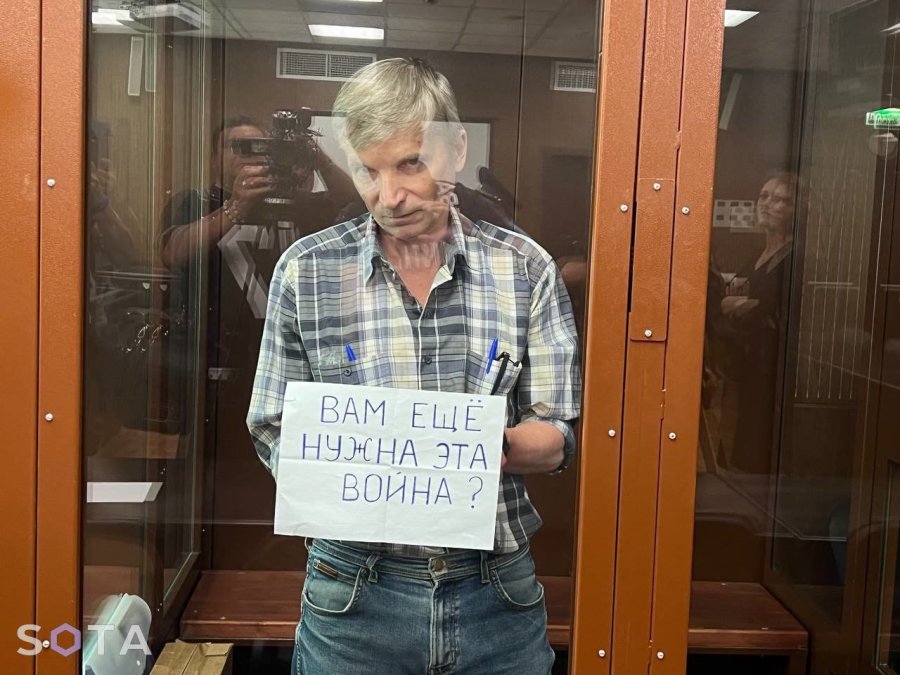
A major event of the past week was the Moscow trial of Alexei Gorinov. Accused of circulating “fake news” about the Russian military, he was sentenced on 8 July to seven years imprisonment.
The case of Alexei Gorinov
On 15 March 2022, at a sitting of the municipal council for Moscow’s Krasnoselsky district, Gorinov proposed that his fellow deputies observe a minute’s silence to commemorate the victims of the “ongoing military aggression in Ukraine”. He also suggested that they should not adopt the proposed plan for vacation activities or hold a competition among children for the best drawing.
On 27 April, Gorinov was arrested. The criminal investigation was opened after two deputies of the State Duma denounced him: Oleg Leonov of the New People group, and Alexander Khinstein of the ruling United Russia movement. For over two months Gorinov was held in an interrogation & detention centre (SIZO) in what he described to friends and colleagues as dreadful conditions.
His trial was held on 7 July 2022 and a great many people came to Moscow’s Meshchansky court to support him. In its closing statement the prosecution demanded that Gorinov be sentenced to 7 years imprisonment in a general-regime colony. Alexei Gorinov delivered his Last Words to the court. The next day the verdict was announced, and an even larger number of supporters gathered outside the courthouse. The number of subscribers to the Alexei Gorinov Telegram channel grew by 2,000 within a single day.
The courtroom, which holds about 70 people, was full. In the “aquarium”, the glassed-box for the accused, Gorinov held a placard reading: “Do you still want this war?” The bailiffs tried standing in the way so that the courtroom audience could not see the wording.
The judge announced that the court had found Gorinov guilty. There would be an interval before sentence was made public, he said, and left the room. The audience gave Gorinov a standing ovation after which the bailiffs drove them out of the courtroom, using physical force. During these events three women were arrested and administrative charges were brought against them.
The court sentenced Gorinov to seven years’ imprisonment in a general-regime penal colony. On the eve of sentencing, he delivered his “LastWords” in Moscow’s Meshchansky district court (adapted from Schwarz translation on the Rights in Russia website).
Gorinov’s Last Words
“Our shared past dictates a few principal lessons to us,that’s always how it seemed to me.
My father returned from the Second World War an invalid. As did his brother. And they were lucky. But they did what they had to, and how: they performed their sacred duty, to defend the Fatherland from the enemy.
I can still remember the Moscow of the 1960s. With its war veterans who were missing arms and legs, who were blind. There were quite a few of them in our building. I grew up among them.
Those who survived the war did not have much to say about it. As I grew older, I understood why. As a human activity, no matter what synonym you may choose, war in and of itself is the lowest, nastiest, dirtiest business of all. An activity unworthy of human beings whom the Universe and evolution have entrusted to preserve and multiply everything that lives on our planet.
War is the most rapid method of dehumanization, of that I am convinced, erasing the line between good and evil. War always means violence and blood, mangled bodies and severed limbs. It always brings death and I do not accept it; I reject it.
This is what our shared past has taught me. And not just me, probably. The Russian Criminal Code contains two articles (353 & 354), which severely punish those who prepare, conduct, [unleash] and promote a war of aggression. And I think that Russia had enough of warin the twentieth century.
For the past five months Russia has been waging war on a neighbouring State, shamefully calling it a “special military operation.” We are promised victory and glory. Why then do a substantial number of my fellow citizens experience feelings of shame and guilt? Why have many left Russia—and still continue to do so? Why does our country suddenly have so many foes?
Maybe there’s something wrong with us? Let’s give that some thought. Give us a chance, at least, to discuss what’s going on. To exchange opinions. That is our constitutional right, when you think about it!
And that’s what I did. At a meeting of the municipal council, I expressed my opinion, my attitude to the subject under discussion. I gave reasons for this opinion, for my attitude, based on my convictions. The majority of those present supported me!
And now I’m in court.
Apparently even this is somehow part of our shared past, yet another unlearned lesson. Persecution for speaking out, fabricated cases, a hasty trial, and belated insight: “Really, we had no idea!”
During the years of Stalinist terror, my grandfather was accused of calling for the overthrow of the Soviet system which through his own efforts he had done much to create and strengthen. My grandfather lived to be fully rehabilitated, half a century later.
I hope my rehabilitation will take far less time. But for now I’m here, in the courtroom. My criminal case is one of the first to be heard, but hundreds of such criminal cases have been opened in Russia against my fellow citizens who are thinking and speaking out about what’s going on. Families have been destroyed; young people’s lives shattered.
I’m speaking on behalf of all who have yet tocome before the court.
The few sentences I uttered at a regular session of the Council of Deputies have been minutely examined. A group of nine investigators was set up, six of whom dealt with “especially important cases.” Five experts were summoned, linguists and psychologists. They rooted around in my thoughts, trying to understand what really underlay the opinion I expressed about one agenda itemto my fellow deputies. What secret meaning, what hidden premise lay behind my words? They generated two expert analyses of 120 pages.
Article 29 of the Russian Constitution, meanwhile, guarantees each person freedom of thought and speech—unless he or she is promoting hatred, hostility, or racial superiority. Each person has the right to freely search for, obtain, transmit, produce, and disseminate information by any legal means. The freedom of mass information is guaranteed. Censorship is prohibited.
During the days of the August 1991 putsch, I was also a deputy. With others, I stood defending the building of the Supreme Soviet, Moscow’s “White House”. We were defending our future, our right to live freely—and, therefore, our right to speak freely, to express our thoughts, to gather information, and to share it.
If they had told me then that, 30 years later, I would be tried by a criminal court for what I had said, for my opinions, I wouldn’t have believed it. The reasons for this sad outcome will require the painstaking efforts of historians to investigate and comprehend. It will require not only comprehension but must lead us to draw conclusions as well. It’s not going to be simple, but we shall have to admit that war is war. We shall have to rehabilitate the victims and put the criminals on trial. We shall have to restore the good name of our people and of our country.
For now, I wish our regime to exercise prudence and this court to show wisdom. I wish everyone swept up by the new wave of repression to be steadfast, as I wish every member of the Ukrainian nation. As for myself, I wish in a future Russia to become the country’s ambassador to Ukraine.
And to everyone who has supported me directly or remotely I say: Do not lose heart! I am with you.”
The Article of the Criminal Code (207.3, ”circulating fake news about the Russian army”, 4 March 2022) under which Gorinov was prosecuted and sentenced is already being called Gorinov’s Law.
Among his supporters at the courthouse was a very elderly lady Lyubov Iosifovna. She was carrying an embroidered handbag bearing the words “No to the War”. A policeman tried to detain her by the courthouse. The people standing around urged him to let her go. In the end she was released.
That same day Gennady Gladkikh was arrested outside the Izmailovskaya metro station in Moscow. He was protesting against the war and in support of deputy Alexei Gorinov. OVD-Info reported that he had not been allowed to see a lawyer.
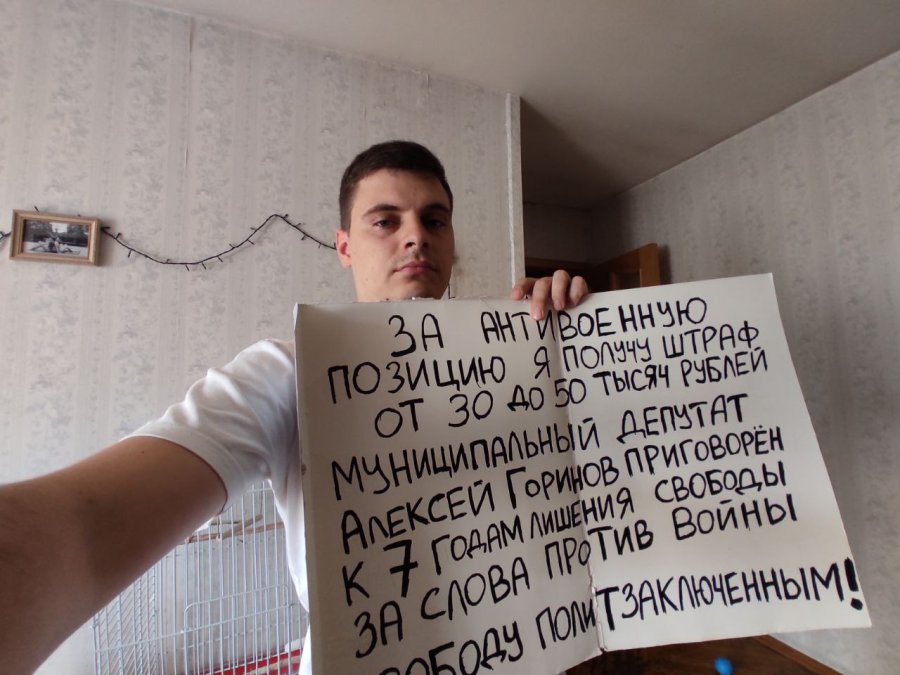
Anti-war art protests
Alisa Gorshenina, an artist from the Urals (Nizhny Tagil) has been producing ethnic and anti-war art. On this red heart she embroidered in red thread the word “pain” in 22 languages of the nations and ethnic groups of Russia. (Not all of the embroidered words translate into English as “pain” since a direct translation of the word does not exist in each and every language.)
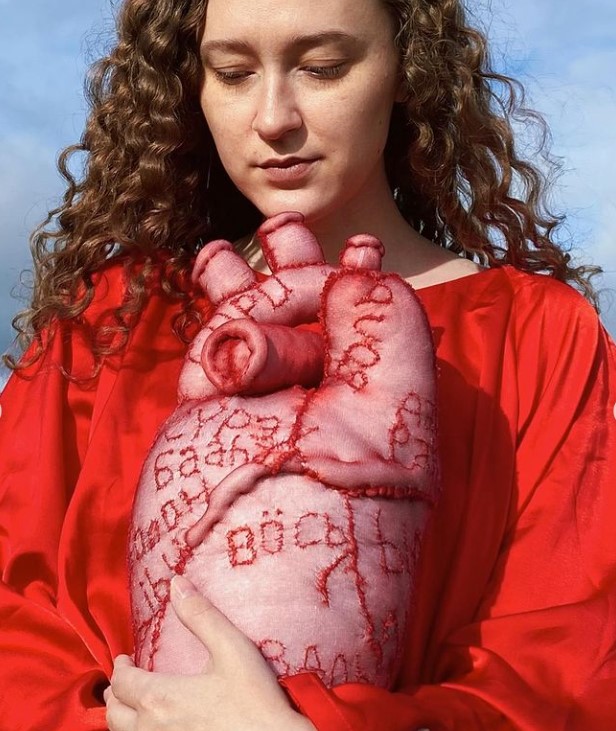
*
In Samara (Volga Federal District) Sergei Tsyrkov wore yellow shorts and a blue tee shirt when he protested with a placard “1984?” The police arrested him but did not draw up charges and eventually let him go.
*
On 5 July, Yury Osokin was arrested in Kievskoe village (Krasnodar Krai) where he lives and was sentenced to 15 days detention for petty hooliganism under Article 20.1 of the Administrative Code. The pretext for his arrest was the helmet he wore to work, decorated with the Peace sign and the words “No war”. He also rubbed out pro-war captions in the room for smokers and replaced them with anti-war slogans. Osokin was arrested at work.
*
In late April this year, the traffic police chased and arrested Alexei Borisov because of the anti-war slogan and Peace sign on his car. Under threat of the vehicle’s confiscation (“an object used to discredit the army”) Borisov was forced to remove the inscription and provide a deposition. In court he was fined 30,000 roubles. Borisov did not appeal against the sentence because he did not believe he would obtain justice in court: in 2021 law-enforcement officers broke one of his ribs at a protest in support of Navalny after which he was also fined.
*
Yelena Osipova, an artist in St Petersburg who survived the city’s wartime blockade, continues to walk the streets, protesting against the war. Nicknamed “the Conscience of Petersburg”, she makes her own posters:
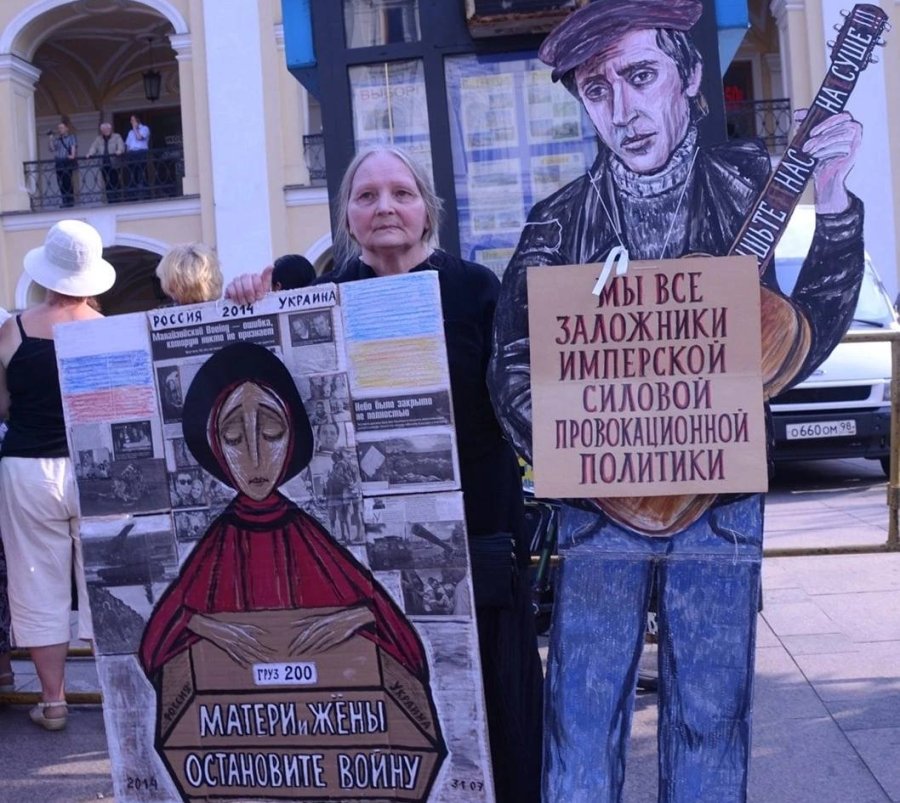
*
Inhabitants of Veliky Novgorod (Northwest Russia) organised a “Bloody Sadko” demonstration which they then showed on YouTube. The protestors dyed the water in “The Merchant Sadko and Tsarevich Volkhov” Fountain red, adding subtitles to the video: “and the waters turned red from the victims’ blood. NO TO THE WAR”. Early next morning the emergency services drained all the dyed water from the fountain – overlooking that in the little Shalunya fountain. The online video ends with the words “No to the War!” and “Peace to Ukraine”, in blue and yellow letters, respectively.
Sabotage
The Freedom for Russia legion delivered a report about small act of sabotage on the railway in the Belgorod Region (Central Russia). By wiring the rails together and causing a short-circuit a signal was sent to the automated system that another train was already on the line.This caused no physical damage but led to confusion and some disruption.
*
An “unidentified explosive device” went off in front of a goods train in the Bryansk Region (Central Russia), reported the region’s governor Alexander Bogomaz. The incident occurred on the Robchik-Peschanka stretch of railway. “As a result, the windows of the engine driver were damaged,” wrote Bogomaz, “but the railroad itself did not suffer and there were no casualties.”
*
In Alushta (Crimea) a local resident pasted a poster on the gates of a local Russian Guardsman. It displayed his photo and read, “Z! Here lives a war criminal who murders children”.
Protests in social media; punishment for publication
The Ostankino district court in Moscow fined Lyusya Stein, a municipal deputy and member of Pussy Riot, for “discrediting” the Russian army. The reason was her post on Twitter in which she said that Russian soldiers had “come to bomb other cities and kill people”. The court record only gave a link to Stein’s statement, the words being replaced by ellipses …
*
On 1 July, at the request of the Prosecutor-General’s Office, the social network Vkontakte blocked the page of Archangel anti-war activist Andrei Churakov. A political scientists, Churakov has been writing since war began about the interplay between the war in Ukraine and political repression in Russia.
*
The Simonovsky district court in Moscow fined Novaya gazeta 300,000 roubles because of a video it circulated about the war in Ukraine. The charges of “fake news” were directed against Dmitry Muratov, the newspaper’s chief editor. The video, first published on the periodical’s website, was later removed at the request of Roskomnadzor (the Media Oversight Agency).
*
Two activists Andrei and Maria married and organised a “Marriage in Black” performance. “We asked our guests to wear black, thereby expressing their grief for all the slain and murdered civilians of the country attacked by Russia.
“On our placards we wrote the most memorable phrases uttered over the past four months by our relatives, friends and family – words that have influenced what we are doing today.”
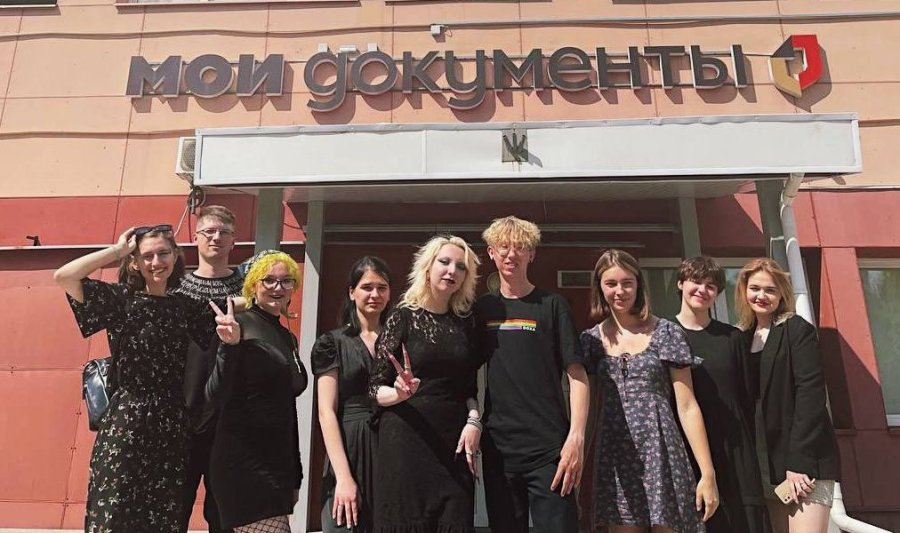
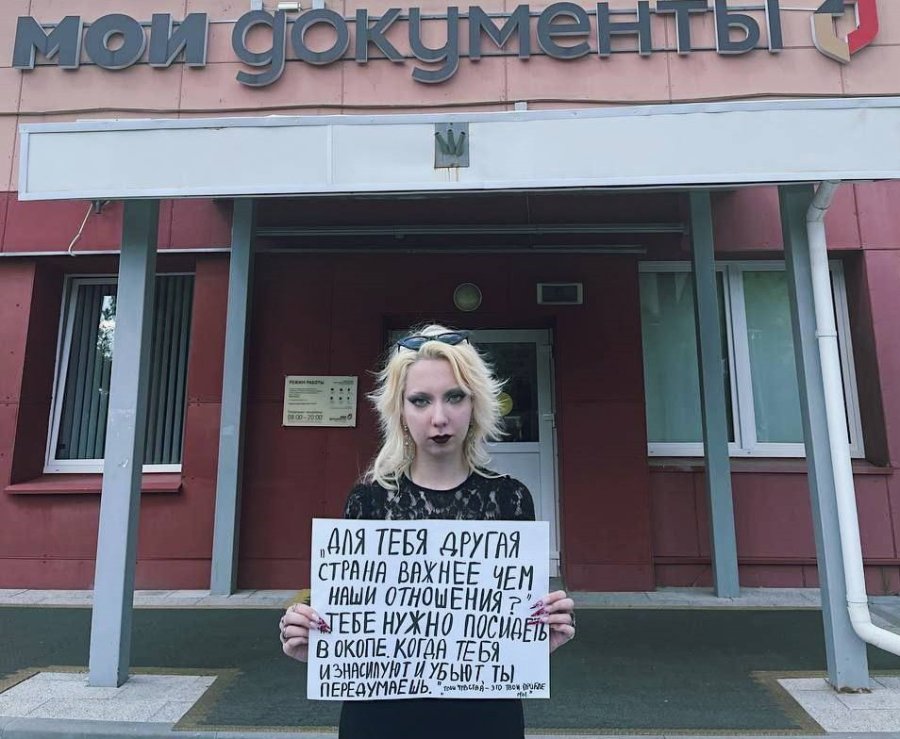
Here we continue not only to talk about anti-war initiatives but also offer background information.
The Vesna youth movement
The Vesna (‘Spring’) youth movement first appeared in 2013. Almost immediately anti-war protests became one of its activities. In February 2014, Vesna activists gathered outside the Ukrainian consulate in St Petersburg to express support for a “fraternal nation”. Those taking part in the picket carried placards, addressed to the then president: “Yanukovych, stop and think! Your hands are covered in blood”.
In June 2015, Vesna activists placed a coffin on St Petersburg’s Field of Mars, next to the burials of those who died during the 1917 Revolution and the Civil War. “To the Unknown Soldier” it read, “who perished in the Donbas during ‘peacetime’.”
In 2022, as Russia invaded Ukraine, the movement became a major organiser of anti-war demonstrations. It coordinated protests on 27 February (more than 2,800 arrested), on 13 March (more than 800 arrested) and 2 April (more than 200 arrested).
On 3 May, Vesna announced that it was organising a demonstration called “They did not fight for this” to be held during the Immortal Regiment procession on Victory Day. The Vesna movement would march that day with portraits of its own veterans, carrying anti-war slogans, and photos of destroyed cities and Ukrainians killed in the war. In response, Vesna said, the regional organisers of the Immortal Regiment began to issue instructions how to prevent their procession being turned into a political demonstration against Russia’s invasion of Ukraine.
In May 2022, criminal proceedings were opened against the movement’s activists under Article 239 of the Criminal Code, which concerns the creation of an NGO that violates the rights and personality of citizens.
This digest was compiled by Memorial volunteers using various Telegram channels: OVD-Info; Horizontal Russia; the Feminist Anti-War Resistance; and Alexei Gorinov and other sources.
Translation, John Crowfoot





